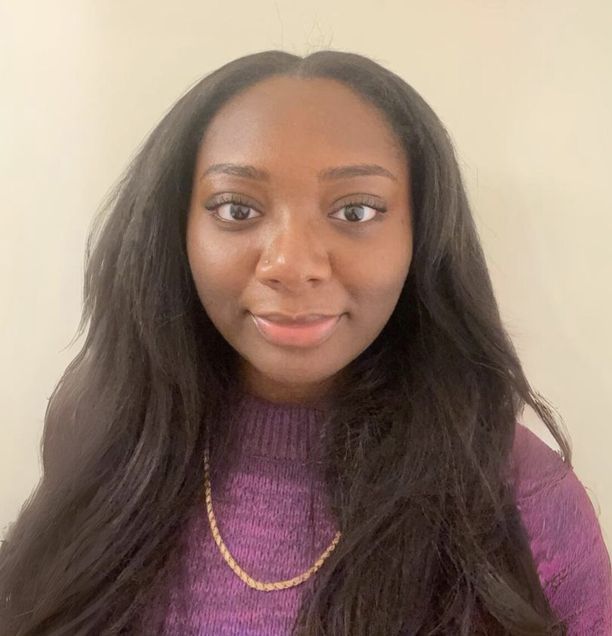
Camille Ofulue (CAS’24) is a senior studying sociology on the pre-Law track. Originally from Houston, Texas, Ofulue is the President of the Epsilon Chapter of Alpha Kappa Alpha, serves on the BU Student Government Mental Health Committee, is an Office Assistant for African American & Black Diaspora Studies, and was a research assistant at Boston Medical Center. Her senior thesis investigates the emotional effects of same-race client dynamics on Black mental health professionals.
Following graduation, Ofulue plans to pursue a degree in counseling psychology and to go to law school. She hopes to work in a law firm representing clients in insurance cases and eventually run for local government in Houston.
This interview has been edited for length and clarity.
How do you balance extracurriculars and classes? Do you have any secret tricks?
Prioritization. School comes first. I need to make sure I have all the grades because I can’t do anything without the grades. I think the biggest lesson I’ve learned is asking for help and knowing what to say ‘no’ to. I want to do everything, but I can’t do everything. I’ve accepted that I can do a few things really well instead of a lot of things very poorly.
What sort of issues have inspired you? What motivates you to do all this important work?
I came to BU because I wanted to get as far away from home as possible. I wanted to see something new. I got here as an economics major. I was like, ‘okay, let’s do this. I’m going to be this finance girl. That’s what I’m going to do.’ Then I just started to see so much of the Black mental health crisis that was a result of COVID-19, like not being allowed to be in community with people, and also low-profile suicides of Black people. I was just like, ‘wow, this is something that I really want to study in depth.’ So I switched my major from economics to sociology, because I wanted to study institutions, why this is happening, what is continuing to happen, and what can help. I added a psychology minor to really understand ‘why do people feel this way?’ And I think the semester after that is when I joined the Boston Medical Center lab.
What does your senior thesis investigate?
I’m doing my thesis on Black mental health. A lot of the studies focus on why Black people aren’t reaching out for therapy, why they aren’t getting it, and issues that are plaguing the Black community’s mental health. I realized there’s a huge lack of understanding about what the Black clinicians are doing and how they are experiencing this mental health crisis. I’m asking them about how they became mental health professionals, why they entered the field, and how they transitioned through the pandemic, especially with the increased number of black people seeking therapy. Less than 15% of all mental health professionals are black. If this huge amount of people are looking for a very small amount of clinicians available, how does that work? I’ve realized that a lot of people feel like it’s their duty to be a Black clinician, especially during that peak shelter-in-place time and even now. But there aren’t a lot of resources to help them be successful as business owners and as private practices or help them get culturally competent training on how not to be so attached to the problems that they’re hearing. This is a big theme I’m looking at — burnout and compassion fatigue. It happens when you hear so much about your clients’ traumatic experiences that it actually elicits a stress response in the provider. It’s difficult not to hear someone’s story and feel bad about it or even equate it to your own life. I’m looking at some of the strategies that can be employed starting in school that can help these Black clinicians not drop out of the profession.
What is your intended career path regarding law?
I’m pre-law because I really want to go into health law. Administration and insurance is super interesting to me. It was inspired by my thesis because a lot of people would say, ‘well, if insurance doesn’t work with me, then I can’t see clients because they can afford it.’ What does that mean? What can the government do? I also really liked studying the legal system in my sociology classes. So I decided to become a lawyer. The more I looked into it, the more passionate I became about both civil rights and health law. I saw how little of the Civil Rights research I was reading focused specifically on mental health. I want to practice,. but ultimately, I want to take the legislative route and work on bills either through lobbying or as an elected official.
Are there any particular classes from CAS or a particular professor that has had a substantial impact on what you plan to do?
So many. Definitely Sociology of Mental Illness with professor Jill Walsj. I think what solidified it for me was Intro to Sociological Theories, as well as Professor Heather Mooney and Professor Saida Grundy. They really solidified in me that this is what I want to do. A constant source of mentorship and inspiration has been Celeste Curington who also serves as my thesis advisor. My advisor, Marcus Shaw, is the one that motivated me to keep going even though I changed majors. He is definitely someone I can go to and get reassurance that I’m doing what I need to do.
Interview by Kelly Broder (COM’27)